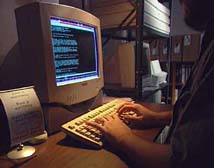The worm uses infected copies of remote-access app VNC and Internet-communications app IRC
Published:
14 March 2003 y., Friday
The latest Internet worm infects Windows NT/2000/XP Professional machines with two Trojan horses and leaves infected systems open for use in future distributed denial-of-service (DDoS) attacks. Unlike previous worms, Deloder (w32.deloder.a) does not spread using e-mail; rather, it scans the Internet looking for open 445 TCP/IP ports.
Deloder carries an infected version of a commonly available network remote administration tool, Virtual Network Computing (VNC), and an Internet Relay Chat (IRC) bot. VNC can be used for legitimate remote access purposes, but used within the context of this worm, it is considered to be a Trojan horse. Because Deloder spreads via shared network connections and could cause future damage to files and systems alike, this worm rates a 6 on the CNET Virus Meter.
Deloder scans the Internet, searching for computers with an open Windows port 445, which corresponds to Microsoft Service Message Block (SMB) over TCP/IP. This port allows the sharing of Windows files, usually protected with passwords. Deloder tries a number of different weak passwords such as password or computer in order to gain access to computers on a network. Corporate systems with strong file-sharing passwords and those behind firewalls should be protected. However, many home systems with default or weak passwords and no firewall may be vulnerable to unauthorized remote access, courtesy of this worm.
Šaltinis:
cnet.com
Copying, publishing, announcing any information from the News.lt portal without written permission of News.lt editorial office is prohibited.
The most popular articles
Software company announced new structure_ of it_s business.
more »
 A number of MEPs urged Internal Market Commissioner Michel Barnier to come up with common rules to regulate cross border online gambling in Europe.
more »
A number of MEPs urged Internal Market Commissioner Michel Barnier to come up with common rules to regulate cross border online gambling in Europe.
more »
 Think before you post as once you do it is online forever. That was the message on Safer Internet Day marked on 9 February by a seminar in the European Parliament.
more »
Think before you post as once you do it is online forever. That was the message on Safer Internet Day marked on 9 February by a seminar in the European Parliament.
more »
 50% of European teenagers give out personal information on the web – according to an EU study – which can remain online forever and can be seen by anybody.
more »
50% of European teenagers give out personal information on the web – according to an EU study – which can remain online forever and can be seen by anybody.
more »
 When did the Commission start working on social networking sites?
more »
When did the Commission start working on social networking sites?
more »
 ICSA Labs, an independent division of Verizon Business, is the first independent security-product testing and certification laboratory to earn ISO/IEC 17025 accreditation, validating the laboratory's world-class capabilities.
more »
ICSA Labs, an independent division of Verizon Business, is the first independent security-product testing and certification laboratory to earn ISO/IEC 17025 accreditation, validating the laboratory's world-class capabilities.
more »
 From today, European citizens, businesses and organisations can register .eu website names using characters from all 23 official languages of the European Union.
more »
From today, European citizens, businesses and organisations can register .eu website names using characters from all 23 official languages of the European Union.
more »
 Authorities investigated 301 mobile phone services websites in follow-up to EU crackdown on misleading consumer practices.
more »
Authorities investigated 301 mobile phone services websites in follow-up to EU crackdown on misleading consumer practices.
more »
 After nearly 2 years of legislative work the Telecom Package is due to be put to a final vote in Parliament on 24 November in Strasbourg.
more »
After nearly 2 years of legislative work the Telecom Package is due to be put to a final vote in Parliament on 24 November in Strasbourg.
more »
 The Christian Science Monitor reports that three men have been named as being the masterminds behind the hacking of RBS WorldPay, a subsidiary of the Royal Bank of Scotland.
more »
The Christian Science Monitor reports that three men have been named as being the masterminds behind the hacking of RBS WorldPay, a subsidiary of the Royal Bank of Scotland.
more »
 BAI’s Banking Strategies Insights reports that banks must get serious about improving their ATMs, especially in the area of envelope-free deposit.
more »
BAI’s Banking Strategies Insights reports that banks must get serious about improving their ATMs, especially in the area of envelope-free deposit.
more »